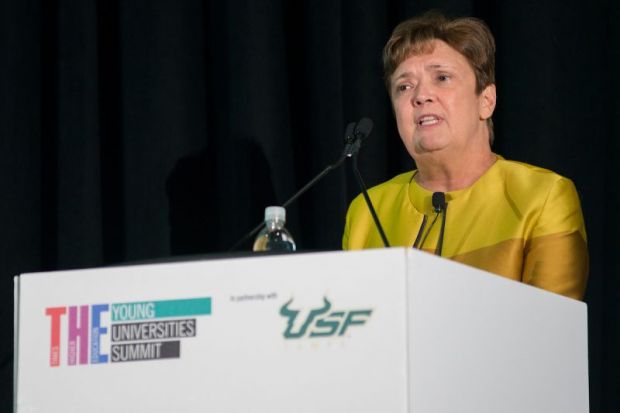Universities need to counter the “false dichotomy between liberal education and preparation for work” espoused by some politicians, who would strip out “so-called frills” such as the search for truth and public service, according to the president of the Association of American Colleges and Universities.
Lynn Pasquerella told the Times Higher Education Young Universities Summit at the University of South Florida that traditional ideals about US higher education had been “replaced by talk of return of investment, tuition in exchange for jobs”.
She added that “some US politicians have gone so far as to advocate for their state workforce needs by composing legislation that would base funding for public colleges and universities exclusively on job acquisition for college graduates”. The arguments of these politicians involved “stripping out so-called frills such as ‘the search for truth’, ‘public service’,” she added.
But this argument, Dr Pasquerella said, relied on a “false dichotomy between liberal education and preparation for work and life”, which “obscures the reality” about how universities and colleges are “catalysing individual and social transformation”.
The AAC&U counts more than 1,400 US higher education institutions among its members, all “committed to extending the advantages of a liberal education to all students, regardless of academic specialization or intended career”.
The AAC&U defines liberal education as “an approach to learning that empowers individuals and prepares them to deal with complexity, diversity, and change”, providing students with “broad knowledge of the wider world (e.g. science, culture, and society) as well as in-depth study in a specific area of interest”.
Dr Pasquerella, formerly a philosophy professor at the University of Rhode Island and ex-president of Mount Holyoke College, said that universities needed to “rewrite” the dominant political narrative by building unity between “public and private, scholar and citizen” and emphasising the “primary purpose of education in fostering lifelong learning”, she continued.
Dr Pasquerella said the values of liberal education emphasised by the AAC&U included the ability of graduates to think critically and work in diverse teams, regardless of discipline.
This was “preparing today’s students for work, citizenship and life”, she added.
Liberal education offers a “critical capacity to understand the relationships between multiple perspectives, including personal, social, cultural, disciplinary, environmental, local, global,” Dr Pasquerella said. This was “critical for bridging cultural divides”, she added.
Dr Pasquerella continued: “When every human being becomes a part of our community, dialogue and concern, then our political deliberations are founded on that common human knowledge, [and] it becomes much more difficult to be dismissive of the well-being of others.”
She argued that universities should move away “from the expert model of knowledge generation” towards “active scholarship which engages with communities”.
POSTSCRIPT:
Print headline: Standing up for liberal education
Register to continue
Why register?
- Registration is free and only takes a moment
- Once registered, you can read 3 articles a month
- Sign up for our newsletter
Subscribe
Or subscribe for unlimited access to:
- Unlimited access to news, views, insights & reviews
- Digital editions
- Digital access to THE’s university and college rankings analysis
Already registered or a current subscriber?






